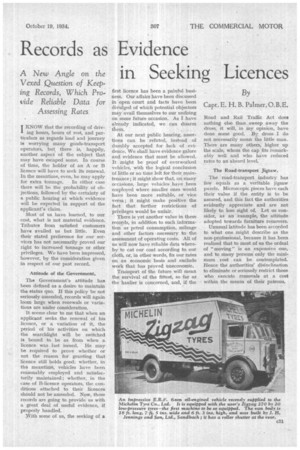Records as Evidence in Seeking Licences
Page 53

If you've noticed an error in this article please click here to report it so we can fix it.
A New Angle on the Vexed Question of Keeping Records, Which Provide Reliable Data for
Assessing Rates By
Capt. E. H. B. Palmer, 0.B.E.
I KNOW that the recording of driv
ing hours, hours of rest, and particulars as regards load and journey is worrying many goods-transport operators, but there is, happily, another aspect of the subject that may have escaped some. In course of time, the holder of an A or B licence will have to seek its renewal. In the meantime, even, he may apply for extra tonnage. In either case there will he the probability of objections, followed by the certainty of a public hearing at which evidence will be expected in support of the applicant's claim.
Most of us have learned, to our cost, what is not material evidence. Tributes from satisfied customers have availed us but little. Even their stated preference for our services has not necessarily proved our right to increased tonnage or other privileges. We have been impressed, however, by the consideration given in respect of our past record.
Attitude of the Government.
The Government's attitude has been defined as a desire to maintain the status quo. If this policy be not seriously amended, records will again loom large when renewals or variations are under consideration.
It seems dear to me that when an applicant seeks the renewal of his licence, or a variation of it, the period of his activities on which the searchlight will be switched is bound to be as from when a licence was last issued. He may be required to prove whether or not the reason for granting that licence still holds good; whether, in the meantime, vehicles have been reasonably employed and satisfactorily maintained ; whether, in the case of B-licence operators, the conditions attached to their licences should not be amended. Now, these records are going to provide us with a great deal of useful evidence, if properly handled.
With some of us, the seeking of a first licence has been a painful business. Our affairs have been discussed in open court and facts have been divulged of which potential objectors may avail themselves to our undoing on some future occasion. As I have already indicated, we can disarm
them.
At our next public hearing, assertions can be refuted, instead of dumbly accepted for lack of evidence. We shall have evidence galore and evidence that must be allowed. It might be proof of overworked vehicles, with the logical conclusion of little or no time left for their maintenance; it might show that, on many occasions, large vehicles have been employed where smaller ones would have been more suitable, or vice versa ; it might make positive the fact that further restrictions of privileges would be unfair.
There is yet another value in these records, in addition to such information as petrol consumption, mileage and other factors necessary to the assessment of operating costs. All of us will now have reliable data whereby to cut our coat according to our cloth, or, in other words, fix our rates on an economic basis and exclude work that has proved uneconomic.
Transport of the future will mean the survival of the fittest, so far as the haulier is concerned, and, if the
Road and Rail Traffic Act does nothing else than sweep away the dross, it will, in my opinion, have done some good. By dross I do not necessarily mean the little man. There are many others, higher up the scale, whom the cap fits remarkably well and who have reduced rates to an absurd level.
The Road-transport Jigsaw.
The road-transport industry has few equals as a veritable jigsaw puzzle. Microscopic pieces have each their value if the entity is to be assured, and this fact the authorities evidently appreciate and are not likely to lose sight of. Let us consider, as an example, the attitude adopted towards furniture removers.
Unusual latitude has been accorded to what one might describe as the non-professional, because it has been realized that to most of us the ordeal of "moving " is an expensive one, and to many persons only the mini:. mum cost can be contemplated. Hence the authorities disinclination to eliminate or seriously restrict those who execute removals at a cost within the means of their patrons.












































































































